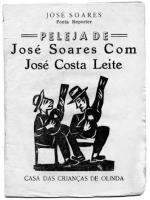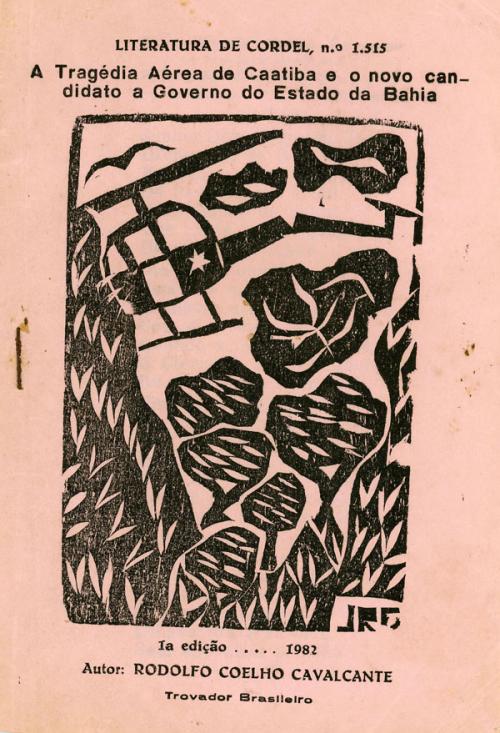Rodolfo Coelho Cavalcante, A Tragedia Aearea da Caatiba e o novo candidato a Governo do Estado da Bahia (The Air Tragedy of Caatiba and of the new candidate for Governor of the State of Bahia)
(Publisher: Trovador Brasileiro; date: 1982)
Cover has linoleum block showing government helicopter breaking up in a landscape, signed JR (S?); pink wrappers, side-stapled with one staple. Trimmed by hand with scissors.
From the collection of Alastair Johnston.
Doggerel addressed to God. The poet’s style is old-fashioned, grammatically correct to the point of pedantry, high-blown and rhetorical. He starts with a description of the accident that took the lives of Cleriston Andrade, the new gubernatorial candidate of Bahia state, along with 12 other politicians and Christians. After listing the dead and their illustrious families, the poet ponders fate:
Perguntei um dia a morte
Porque tanto ela matava
Pessoas de alto nivel
E as familias enlutava? …
A morte me respondeu:
– É essa o destino meu…
|  |
(One day I asked Death
Why she kills so many
Persons of high station
And from noble families?
Death told me:
– That is my destiny…)
|
Death adds a list of illustrious dead including Adam, Noah, Abraham, Napoleon, Buddha, Confucius and King Solomon. The structure changes to six-lined stanzas in AABCCB rhyme for the next nine verses of lists of famous people who have died, such as:
– Hitler, Nero, Mussoline,
Stalin, Max [sic], Lenine.
Matei-os sem piedade,
Da mesma forma Byron,
Victor Hugo, Agamenon-
Vultos da Humanidade!
When Death ends, by saying
Não pode haver contra-tempp
Sou a Justiça do Tempo
Porque meu nome é a Morte!
|  |
(Make no mistake
It’s Time’s justice
Because my name is Death!)
|
The emphatic last word is set in Sans Serif type. Death kills without distinction. "So dear readers," he goes on, "stay calm because death will get to us all. The body dies, but the soul lives. But one thing remains unanswered and that is: all the weeping mourners want to know whom the new candidate for governor will be! On the eighth of October the illustrious governor announced the name of the new candidate: João Durval Carneiro [set in sans, like ‘Morte’]!" The poem ends with the poet asking the sitting governor, Antonio Carlos, not to forget his eulogizer. Carneiro assumed the governorship of Bahia 15 March 1983. Quite possibly the new candidate paid for the work to be written and printed.
The author, Rodolfo Cavalcante is a well-known cordelista. Born in 1919 in Alagoas, president of three successive poets’ organizations, he wrote The Girl who Beat her Mother and Turned into a Dog, which sold 432,000 copies in 29 editions. Cavalcante lives in Liberdade, a poor suburb of Salvador da Bahia. He has his own printing press. He has been compared to the 13th-century Italian poet Dante Alighiere, for his work A chegada de Lampião no Céu.


